If you’re considering towing a trailer or camper, you may be wondering if using a hitch extender will reduce your towing capacity.
In this blog post, we’ll discuss whether or not a hitch extender has any effect on towing capacity.
Does A Hitch Extender Reduce Towing Capacity?
Yes, a hitch extender reduces towing capacity by redistributing the weight of the trailer.
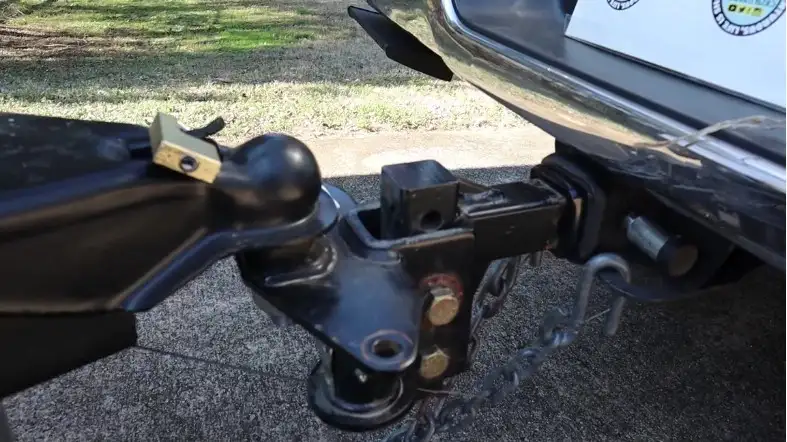
This can cause your vehicle to tow the trailer less efficiently and put strain on your vehicle’s engine, transmission, and brakes.
So, if you’re planning on towing a trailer or camper, we recommend not using a hitch extender.
Are Hitch Extenders Safe?
Hitch extenders are generally safe to use.
You can use a hitch extender safely as long as you don’t exceed 50% of the hitch and vehicle’s load capacity, or 400 lb tongue weight capacity.
Also, make sure the hitch extender is properly secured and that the trailer’s coupler is locked onto the ball mount.
On the other hand, if you’re not planning on towing a trailer or camper, then a hitch extender may be a good option for you.
Hitch extenders can be used to carry bikes, kayaks, and other cargo. Just make sure you don’t exceed the weight limit of the hitch and vehicle.
So, if you’re considering using a hitch extender, just be aware that it will reduce your towing capacity and take proper precautions to ensure safety.
How Much Weight Can A Hitch Extender Hold?
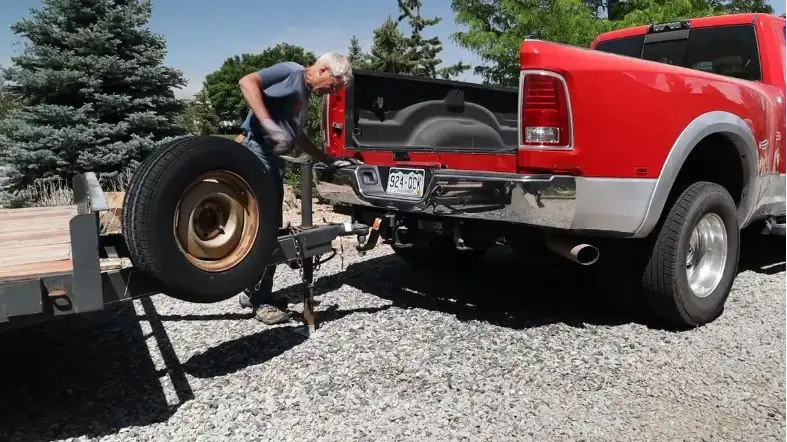
When used properly, a hitch extender can hold up to 50% of the hitch and vehicle’s load capacity, or 400 lb tongue weight capacity.
Besides weight capacity, you also need to take into account the length and width of the hitch extender.
Make sure the hitch extender is long enough so that it doesn’t put a strain on your vehicle’s hitch, but not too long that it becomes a safety hazard.
Most hitch extenders are between 12″ to 18″ long. The width of the hitch extender should also be considered.
A wider hitch extender will distribute the weight of the cargo more evenly and be less likely to bend or break.
When choosing a hitch extender, make sure to pick one that is made from high-quality materials and can support the weight of your cargo.
Also, check the reviews to see what other customers have to say about the hitch extender.
How Much Over Towing Capacity is Safe for A Hitch Extender?
As long as the hitch extender’s weight capacities don’t exceed 50 percent of the hitch and vehicle’s maximum limit, it is safe to use.
Remember to pick a hitch extender that fits your needs, and use it as directed. If you’re unsure about what size you need, always consult with a trailer hitch expert.
It’s also important to evenly distribute the weight on the hitch extender and never overload one side.
If your trailer is carrying a lot of weight, investing in a weight-distributing hitch will ensure that the load is distributed evenly, thus improving towing capacity.
Can You Use a Hitch Extender with a Weight Distribution?
No, you cannot use a hitch extender with a weight distribution.
A weight distribution is designed to distribute the trailer’s tongue weight evenly across the axle of the tow vehicle.
If you were to use a hitch extender with a weight distribution, it would throw off the distribution and decrease your towing capacity.
In addition, it would be more difficult to maneuver your trailer and you could damage your vehicle.
For these reasons, it’s important to not use a hitch extender with a weight distribution.
Is It Safe to Use A Hitch Extender To Reduce Towing Capacity?
Yes, it is safe to use a hitch extender to reduce towing capacity.
You can use a hitch extender safely as long its weight capacities don’t exceed 50 percent of the hitch and vehicle’s maximum limit.
However, it’s important to make sure that the hitch extender is the right size for your needs and that you use it correctly.
In addition, make sure to distribute the weight evenly on the hitch extender and never overload one side.
If your trailer is carrying a lot of weight, investing in a weight-distributing hitch will ensure the load is evenly distributed, thus improving towing capacity.
What Is The Purpose Of A Hitch Extender?
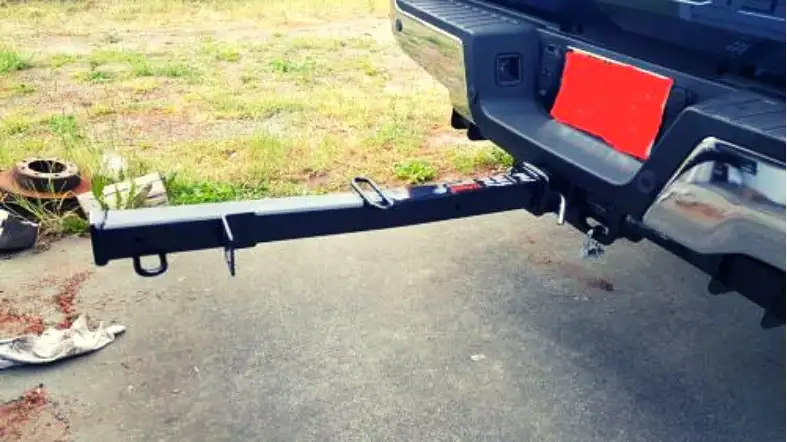
Hitch extenders are tubes that go into your trailer hitch in order to create more space between the bumper of your vehicle and a spare tire mounted on the back.
Besides, a hitch extender is used to extend the reach of your vehicle’s hitch.
This can be useful if you’re trying to tow a trailer or camper that is too long for your vehicle.
Hitch extenders are also useful for carrying bikes, kayaks, and other cargo.
Keep in mind that a hitch extender will reduce your towing capacity and you should take proper precautions to ensure safety.
Choose a high-quality hitch extender made from durable materials and make sure it can support the weight of your cargo.
The Pros and Cons of Using a Hitch Extender
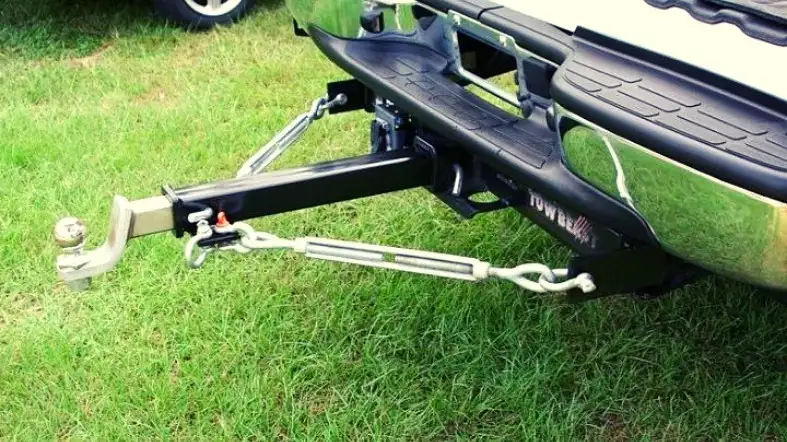
There are both pros and cons to using a hitch extender. Let’s start with the pros:
Pros:
1. Can be used to extend the reach of your vehicle’s hitch.
2. Can be used to carry bikes, kayaks, and other cargo.
3. Hitch extenders are generally safe to use as long as you don’t exceed the weight limit.
4. Most hitch extenders are made from high-quality materials and can support a lot of weight.
Now, let’s look at the cons:
1. Hitch extenders will reduce your towing capacity.
2. Can cause your vehicle to tow the trailer less efficiently.
3. Put strain on your vehicle’s engine, transmission, and brakes.
4. Can be dangerous if not used properly.
So, there are both pros and cons to using a hitch extender. It’s important to weigh the pros and cons before deciding whether or not to use one.
How To Choose The Right Hitch Extender For Your Vehicle?
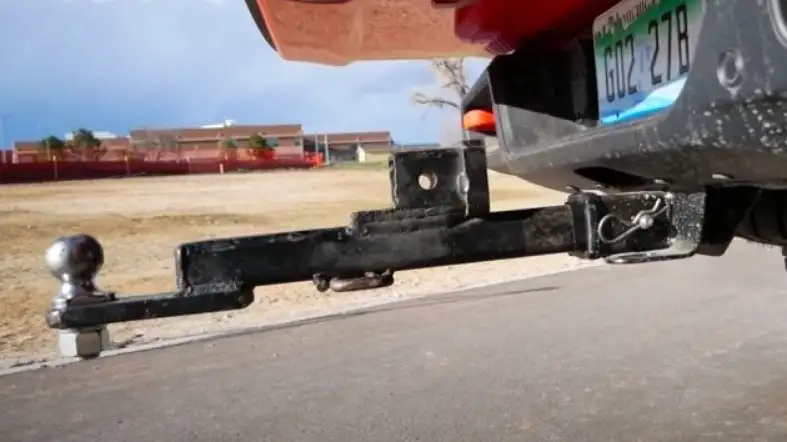
When choosing a hitch extender, there are a few things you need to take into consideration.
Follow the below section to help you choose the best hitch extender for your vehicle:
1. The first thing you need to do is measure the space between your vehicle’s bumper and the spare tire. This will give you an idea of how long of a hitch extender you need.
2. Next, you need to consider the weight capacity of the hitch extender. Make sure it can support the weight of your cargo.
3. Also, take into account the length and width of the hitch extender. You don’t want one that is too long or too short.
4. Finally, make sure the hitch extender is made from high-quality materials and can support the weight of your cargo.
So, you need to follow the above steps to ensure you choose the best hitch extender for your vehicle.
How to Use a Hitch Extender Safely?
Here are some tips on how you can use a hitch extender safely:
1. The first thing you need to do is make sure the hitch extender is properly secured to your vehicle’s bumper.
2. Next, you need to attach the trailer to the hitch extender.
3. Make sure the weight of your cargo does not exceed the weight limit of the hitch extender.
4. Finally, take it slow and be careful when driving with a hitch extender.
Following these tips will help you use a hitch extender safely.
FAQs
Do I Need A Hitch Extender?
If you’re not planning on towing a trailer or camper, then you probably don’t need a hitch extender.
Hitch extenders are mainly used to redistribute the weight of the trailer so that your vehicle can tow it more
Can I Tow A Trailer With A Hitch Extender?
Yes, you can tow a trailer with a hitch extender, but we don’t recommend it because it will reduce your towing capacity.
If you do decide to use a hitch extender, make sure it’s made from high-quality materials and can support the weight of your cargo.
Is It OK To Use A Hitch Extension?
Yes, it’s perfectly fine to use a hitch extension as long as you don’t exceed the weight limit.
Most hitch extensions are made from high-quality materials and can support a lot of weight.
How Many Hitch Extenders Can You Use?
Never use more than 1 hitch extender.
When you use more than 1 hitch extender, it can decrease your towing capacity by as much as 50%.
In addition, it can make it difficult to maneuver your trailer and you could damage your vehicle.
Is It Legal to Use A Hitch Extender?
There are no federal laws against using a hitch extender.
How Do I Measure For A Hitch Extender?
To measure for a hitch extender, you will need to know the rise, drop, and length of your trailer hitch. The rise is the distance from the ground to the top of the trailer hitch receiver.
The drop is the distance from the ground to the bottom of the trailer hitch receiver.
The length is the distance from the center of the trailer hitch pin hole to the end of the trailer hitch receiver.
Final Thoughts
Now that you know all about hitch extenders, it’s time to decide whether or not you should use one.
If you’re going to be carrying a lot of cargo or towing a long trailer, then a hitch extender is definitely a good idea.
Just make sure to choose one that is made from high-quality materials and can support the weight of your cargo.
